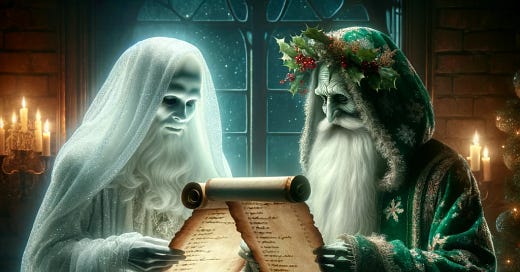The Ghost Of Christmas Past And The Ghost Of Christmas Present Compare Time Prices
From 1850 to 2019 global population increased by 507 percent while the abundance of 26 basic commodities has increased by 5,726 percent for blue-collar workers.
Is Christmas Present better or worse than Christmas Past? British author Charles Dickens (1812-1870) wrote A Christmas Carol 180 years ago in 1843. It tells the tale of Ebenezer Scrooge and his time-travels.
Professor David Jacks of Simon Fraser University in British Columbia, Canada maintains a database of the nominal prices of 26 basic commodities back to 1850. We calculated the time price for each one of these commodities and the compared them to their 2019 time prices. We found that for the time required to earn the money to buy one basket of the 26 basic commodities in 1850, blue-collar workers would get 58.62 baskets in 2019. Personal resource abundance increased by an average of 5,762 percent with sugar increasing the most by 22,583 percent while coal increased the least by 534 percent. Abundance has been increasing at a 2.45 percent rate compounded annually, doubling in abundance every 28.6 years.
When Scrooge is visited in his counting-house by two benefactors during the Christmas season seeking donations for the poor and destitute, he angrily replies that prisons and workhouses are the only institutions he is willing to support. When one of the benefactors points out that many would rather die than go to these places, Scrooge goes further with a Malthus-Thanos view that they’d better do it, and decrease the surplus population.
From 1850 to 2019 global population increased by 6.48 billion, or 507 percent from 1.28 billion to 7.76 billion. Every one percent increase in population corresponded to a 11.36 percent increase in personal resource abundance. More people with the freedom to innovate have lifted billions out of poverty.
If the Ghost of Christmas Yet to Come had brought Scrooge to our day, Ebenezer would have been profoundly astonished at our standard of living, how many more people there are, and how much longer they live. Just the sight of an iPhone would have would have made him believe that he was visiting an entirely different planet.
So this Christmas while we recognize that there are still those who are poor and downtrodden among us, we must be deeply grateful for how far we’ve come in lifting billions out of poverty with the light of human freedom and creativity. Scrooge would be most pleased with our progress.
We describe the process of transforming scarcities to abundances in our new book, Superabundance, available at Amazon. There has never been a better time to create more life.
Gale Pooley is a Senior Fellow at the Discovery Institute and a board member at Human Progress.






